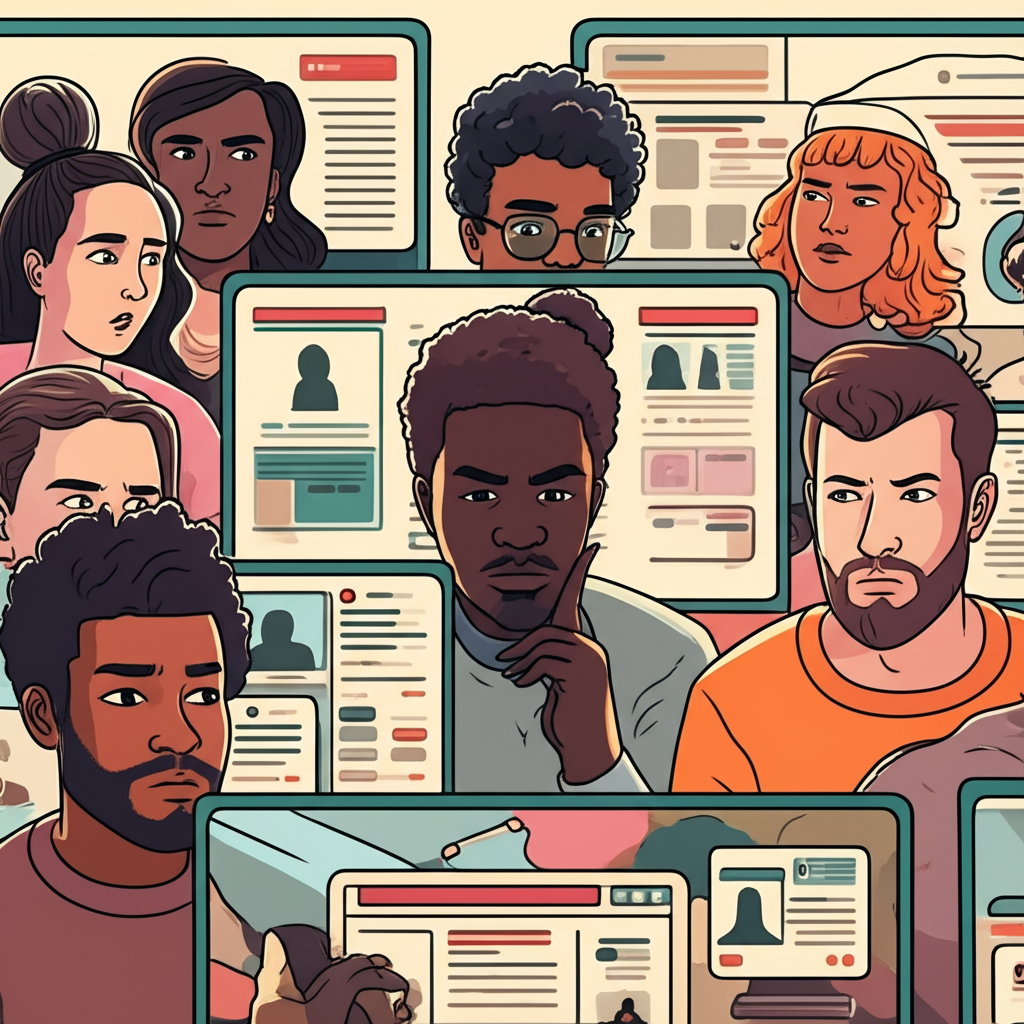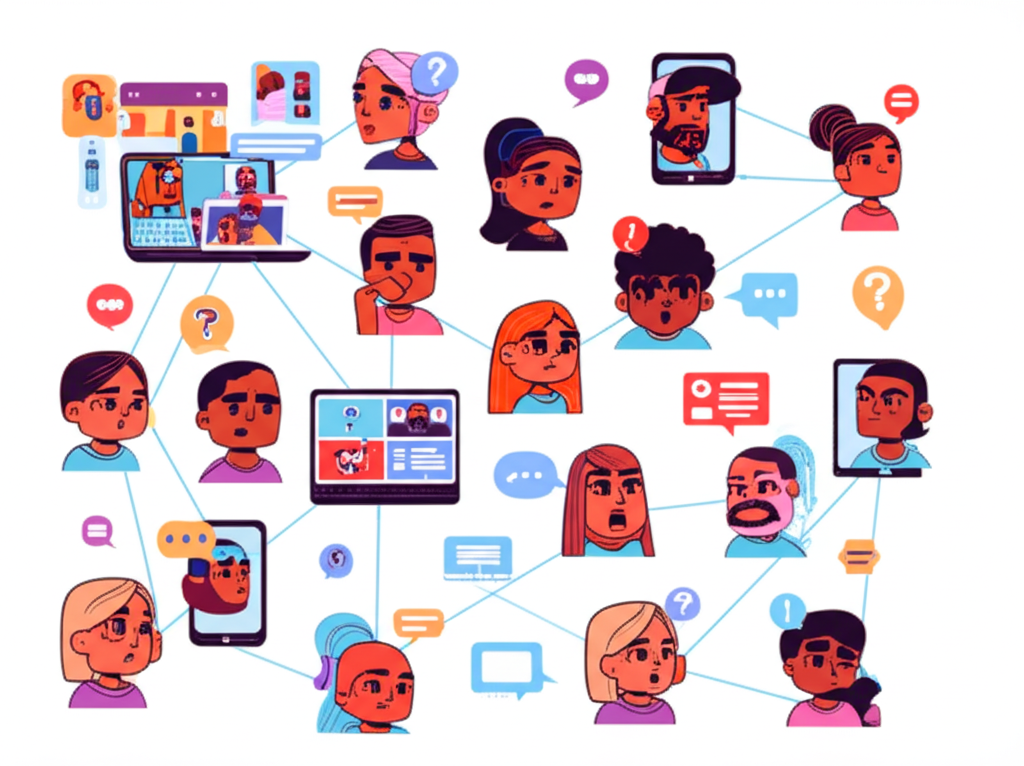Introduction: What Does “Keeping Fundies” Entail?

In the ever-evolving terrain of internet culture, few dynamics capture attention quite like the phenomenon known as “keeping fundies.” Far more than a niche pastime, it represents a widespread form of digital observation centered on individuals and communities associated with religious fundamentalism. This engagement spans a spectrum—from genuine curiosity about alternative lifestyles to pointed social critique, often delivered with irony or satire. At its core, “keeping fundies” involves tracking, analyzing, and discussing the beliefs, behaviors, and public presence of those who live by strict religious doctrines. This article unpacks the meaning, motivations, and implications behind this cultural trend. We’ll explore the origins of religious fundamentalism, examine how it manifests today, and analyze the online spaces where these conversations unfold. By understanding both the ideology and the digital response it provokes, we gain insight into broader societal tensions around belief, autonomy, and identity.
Deconstructing “Fundie”: A Definitional and Historical Context

To fully grasp what “keeping fundies” means, it’s essential to understand the term itself and the historical roots of the ideology it references. While “fundie” is often used casually online, it carries a weight shaped by over a century of religious, cultural, and political shifts.
The Origins of “Fundamentalism” and the Rise of “Fundie”
The concept of fundamentalism traces back to the early 1900s, particularly within conservative Protestant circles in the United States. It emerged as a reaction to modernist theology, scientific developments like Darwinian evolution, and rising secularism—all of which challenged traditional biblical authority. In response, a group of theologians published a series of essays titled *The Fundamentals*, affirming doctrines such as the inerrancy of Scripture, the virgin birth of Christ, and the literal resurrection. These became the theological bedrock of what would later be known as fundamentalism. Over time, the movement solidified around a commitment to preserving what adherents saw as unchanging religious truths in a changing world. The term “fundie,” though informal and often pejorative, evolved in online spaces as shorthand for individuals or families who embody these values in visible, sometimes extreme ways. While not always intended as an insult, its usage typically implies a critical or detached perspective, highlighting perceived rigidity or separation from mainstream society.
Core Characteristics and Beliefs of Fundamentalist Groups
Despite differences across denominations and religions, fundamentalist communities often share a set of defining traits. A cornerstone of their worldview is biblical literalism—the belief that sacred texts are divinely inspired and factually accurate in every detail. This shapes how they interpret morality, history, and human relationships. Gender roles are typically rigid, with an emphasis on patriarchy: men are viewed as spiritual and household leaders, while women are encouraged to embrace roles centered on motherhood, domesticity, and submission. Modesty in dress and behavior is strongly emphasized, especially for women, with rules governing everything from hemlines to social interactions. Education often takes place outside the public system, with homeschooling or faith-based schools used to protect children from what’s seen as corrupting secular influence. Courtship, rather than dating, is frequently practiced, involving parental oversight and strict boundaries on physical contact before marriage. These practices are part of a broader effort to maintain spiritual purity and cultural separation, creating communities that are intentionally distinct from the wider world.
The Phenomenon of “Keeping Up With Fundies” in the Digital Age

The rise of digital platforms has transformed how we observe and interact with subcultures, and few have been as visibly impacted as the world of religious fundamentalism. What was once private—family vlogs, church sermons, courtship rituals—now plays out in public view, fueling the phenomenon known as “keeping up with fundies.” This isn’t just about entertainment; it’s a complex form of cultural engagement driven by curiosity, critique, and connection.
Why the Fascination? Motivations Behind Online Observation
The reasons people follow fundamentalist communities online are varied and often deeply personal. For many, the appeal lies in the stark contrast between these lifestyles and mainstream norms. The structured routines, elaborate dress codes, and unique family dynamics can seem almost theatrical, drawing viewers in much like reality television. For others, especially those who have left fundamentalist backgrounds, these online spaces serve as vital support networks. They offer a place to process trauma, share stories of deconstruction, and find validation after years of isolation. Some engage from a sociological standpoint, studying belief systems, authority structures, and the psychology of high-control environments. Still others use these platforms for activism, calling attention to issues like gender inequality, lack of educational freedom, or coercive control within certain groups. Whether motivated by empathy, critique, or simple intrigue, the act of observing becomes a way to make sense of a world that operates by vastly different rules.
The Digital Landscape: Platforms and Communities
The digital ecosystem surrounding “keeping fundies” is both expansive and fragmented. Reddit hosts some of the most active communities, including r/exfundamentalist, where former members share recovery stories, and r/FundieSnarkUncensored, where users dissect and satirize fundamentalist content. Tumblr has long been a hub for critical commentary, particularly around purity culture and gender roles. YouTube channels analyze sermons, critique homeschool curricula, and document the lives of high-profile fundamentalist families. TikTok and Instagram amplify personal narratives, with ex-members using short-form video to explain their journeys in accessible ways. These platforms allow for rapid information sharing, real-time reactions, and the formation of tight-knit communities. While some spaces prioritize respectful dialogue, others lean into humor, sarcasm, or outright mockery—what’s often called “fundie snark.” Regardless of tone, these communities play a key role in shaping public understanding of fundamentalism and its impact.
Key Themes and Debates in “Fundie” Online Discussions

Discussions around fundamentalism rarely stay abstract. Instead, they focus on tangible practices that highlight the clash between insular belief systems and broader cultural values. These recurring themes serve as flashpoints in online discourse.
Gender Roles, Modesty, and Courtship Culture
Few topics generate as much discussion as the treatment of gender within fundamentalist communities. The emphasis on male leadership and female submission is frequently scrutinized, with critics questioning how such roles affect personal freedom and equality. Modesty culture, in particular, draws intense attention—especially when dress codes dictate long skirts, covered hair, or prohibitions on swimming. Observers often point out the double standards, noting that women are held responsible for men’s thoughts and actions. Courtship practices, which often replace dating with chaperoned meetings and parental approval, are another focal point. Many find these systems outdated or emotionally stifling, particularly for young women whose romantic choices are heavily controlled. These debates aren’t just about rules; they’re about power, agency, and the long-term psychological effects of growing up in a system that polices behavior so closely.
Education, Indoctrination, and Autonomy
Education is another major point of contention. Homeschooling is common in fundamentalist circles, often framed as a way to protect children from secular influences. However, critics argue that some curricula prioritize religious doctrine over scientific or historical accuracy—teaching creationism instead of evolution, for example, or promoting a biased view of world history. This raises concerns about intellectual development and critical thinking. When education is used to reinforce dogma rather than encourage inquiry, it can feel less like learning and more like indoctrination. Former students often report gaps in their knowledge and difficulty adjusting to college or the workforce. The broader question at play is one of autonomy: to what extent should children be shielded from diverse ideas, and what happens when they eventually encounter a world that contradicts everything they’ve been taught?
Public Figures, Media Representation, and Accountability
When fundamentalist families or leaders enter the public eye—through reality TV, political campaigns, or social media—they invite heightened scrutiny. Figures like the Duggars or Bryan Fischer have become symbolic of the movement, their lives dissected by online communities. This visibility brings ethical questions: where do we draw the line between public accountability and invasion of privacy? When individuals use their platforms to promote policies that restrict LGBTQ+ rights or limit reproductive freedom, their personal lives become part of a larger political conversation. Online observers often analyze their messaging, pointing out contradictions—such as advocating for family values while facing allegations of abuse or financial misconduct. These discussions serve a dual purpose: they satisfy public curiosity and act as a form of grassroots accountability, challenging narratives that might otherwise go unchallenged in mainstream media.
Beyond Observation: The Deeper Impact of Fundamentalism
While much of “keeping fundies” centers on observation, the conversation inevitably leads to deeper questions about harm, healing, and social influence. The effects of fundamentalism extend far beyond the pulpit or the family home.
The Challenges of Deconstruction and Leaving Fundamentalism
For ex-fundamentalists, leaving is rarely a simple decision—it’s often a years-long process of deconstruction. This involves reevaluating every belief, from theology to morality to identity. The psychological toll can be severe. Many report anxiety, depression, and PTSD, especially if they experienced emotional or spiritual abuse. Leaving a high-control group often means losing family, friends, and an entire support system. Some are disowned; others live in fear of eternal punishment. Navigating the secular world can feel overwhelming—everything from choosing a career to understanding social cues becomes a learning process. Online communities are crucial in this transition, offering resources, emotional support, and a sense of belonging. According to research from the Pew Research Center, deeply religious individuals often hold views that diverge sharply from the general population, underscoring the ideological gulf that ex-members must cross.
Societal and Cultural Implications
The influence of fundamentalist movements isn’t limited to private life—it shapes public policy and national debates. These groups are often politically active, advocating for legislation based on their religious beliefs, particularly around abortion, marriage, and education. Their lobbying efforts have had real-world consequences, from the rollback of reproductive rights to the expansion of school voucher programs. “Keeping up with fundies” can therefore be seen as more than a cultural pastime; it’s a response to the growing visibility of religious ideology in governance. It reflects broader anxieties about the boundaries between faith and state, individual rights and communal authority. By observing and critiquing these movements, the public engages in an ongoing negotiation about what kind of society we want to live in—one that values pluralism and autonomy, or one shaped by rigid, dogmatic frameworks.
Navigating the Discussion: Ethics, Empathy, and Understanding
Discussing fundamentalism online requires care. While critique is necessary, it’s important to avoid dehumanizing individuals or painting entire groups with the same brush. Many people raised in these communities are not ideologues—they’re survivors, seekers, or simply trying to live by what they believe. Ethical engagement means focusing on systems and structures rather than mocking personal beliefs. It means recognizing the difference between holding leaders accountable and harassing private individuals. It also means listening to ex-members without demanding trauma porn or sensational stories. Platforms should foster dialogue, not pile-ons. Resources like the Internet Ethics Resources offer guidance on responsible digital interaction, emphasizing transparency, respect, and proportionality. The goal isn’t to silence criticism, but to elevate it—making space for thoughtful, informed conversation that acknowledges complexity.
Conclusion: “Keeping Fundies” as an Evolving Cultural Dialogue
“Keeping fundies” is more than internet voyeurism—it’s a cultural barometer. It reflects how we process belief, difference, and power in the digital age. What begins as curiosity often evolves into deeper inquiry about freedom, identity, and the role of religion in public life. From defining the characteristics of religious fundamentalism to examining the lived experiences of those who leave, this phenomenon offers a window into one of society’s most enduring tensions: tradition versus progress. As long as fundamentalist groups remain visible—and as long as digital platforms enable public discourse—this conversation will continue to evolve. The challenge lies in maintaining a balance: staying critically engaged without losing empathy, questioning ideologies without attacking individuals, and using observation as a tool for understanding, not division.
Frequently Asked Questions (FAQ)
What is the precise definition of “fundie” and how does it relate to religious fundamentalism?
“Fundie” is a colloquial, often informal or critical, term derived from “fundamentalist.” It refers to individuals or groups who adhere strictly to a literal interpretation of their religious texts and traditions, often emphasizing a return to perceived “fundamental” principles. While `fundamentalism` is a broader theological and social movement, “fundie” specifically describes those perceived to embody its most conservative and distinct characteristics, particularly in an online context.
Can you provide examples of common beliefs and practices associated with “fundies”?
Common `fundamentalist beliefs` and practices often include:
- **Biblical Literalism:** Interpreting religious texts (e.g., the Bible) as entirely accurate and literally true.
- **Distinct Gender Roles:** Emphasizing traditional, often patriarchal, roles for men and women.
- **Modesty Standards:** Strict dress codes and behavioral expectations, particularly for women.
- **Homeschooling/Religious Education:** Prioritizing education within religious frameworks to shield children from secular influences.
- **Courtship:** A structured approach to finding a spouse, often with parental involvement, rather than modern dating.
- **Separation from Mainstream Culture:** Limiting engagement with secular media, entertainment, and social practices.
Why has the online phenomenon of “keeping up with fundies” become so prevalent?
The prevalence of `keeping fundies` stems from several factors: **Curiosity** about distinct lifestyles, **entertainment** value, a platform for **`ex-fundamentalist` individuals** to share experiences and find support, **critical social commentary** on perceived harmful aspects of fundamentalism, and a general **`cultural observation`** of unique subcultures facilitated by social media’s transparency.
What are the key differences between a “fundie” and a devout Christian or conservative evangelical?
While `fundie` (fundamentalist) shares common ground with devout Christians and conservative evangelicals (e.g., belief in Jesus, importance of scripture), the key differences lie in the *degree* of literalism, cultural separation, and adherence to specific social practices. Fundamentalists typically exhibit a more extreme form of `biblical literalism`, stricter `modesty culture`, more rigid `gender roles`, and a greater emphasis on withdrawing from or actively opposing mainstream secular culture. Many devout Christians and evangelicals engage with the modern world more readily and hold more nuanced theological or social views than those labeled as “fundies.”
Is the term “fundie” considered offensive, and how should it be used responsibly?
The term “fundie” can be considered offensive by those it describes, as it often carries a derogatory or dismissive connotation in online discussions, particularly within `fundie snark` communities. Responsible usage involves recognizing its informal nature and potential to generalize. When discussing `religious fundamentalism`, it’s often more respectful and precise to use “fundamentalist” or specific denominational terms, focusing on actions and beliefs rather than labeling individuals with a potentially pejorative slang term. Emphasize critical analysis over mere ridicule.
How do fundamentalist views on gender roles, education, and social interaction typically manifest?
Fundamentalist views typically manifest as:
- **Gender Roles:** Strong adherence to `patriarchy`, with men as spiritual leaders and providers, and women as homemakers, mothers, and supportive wives.
- **Education:** `Homeschooling` or private religious schools are favored to control curriculum and shield children from secular influences, often prioritizing religious instruction.
- **Social Interaction:** Limited engagement with secular media, strict `courtship` rules instead of dating, and often a preference for social circles exclusively within their religious community, promoting `separation from mainstream culture`.
What are some of the common challenges individuals face when leaving a fundamentalist background?
`Ex-fundamentalist` individuals often face significant challenges, including a sense of **loss of community** and family support, an **identity crisis** as they redefine their beliefs and values, **trauma** from past experiences, and difficulties **adapting to a secular world** (e.g., navigating dating, different social norms, academic and career paths). They may also struggle with mental health issues like anxiety and depression, and the process of `deconstruction` can be emotionally taxing. Support `online communities` often play a crucial role in providing connection and resources during this transition.
Are there specific online communities or platforms dedicated to “keeping up with fundies”?
Yes, numerous `online communities` and platforms are dedicated to `keeping fundies`. Prominent examples include various subreddits (e.g., r/FundieSnarkUncensored, r/exfundamentalist), Tumblr blogs, YouTube channels, and dedicated groups on other social media platforms. These spaces facilitate discussion, observation, and often `fundie snark`, providing platforms for both critical commentary and support for `ex-fundamentalist` individuals.
What are the ethical considerations when discussing or critiquing fundamentalist lifestyles publicly?
Ethical considerations include: **Respect for privacy** (especially for non-public figures), **avoiding harmful generalizations** and stereotypes, **focusing on ideologies and actions** rather than personal attacks, and **maintaining empathy** for individuals, particularly those who may be questioning or suffering within `high-control group` environments. While critique is valid, it should aim for informed discussion and social commentary, not harassment or dehumanization. Transparency about one’s own biases is also important.
How has media and social media shaped the public perception of fundamentalist groups?
Media and social media have significantly shaped public perception by providing unprecedented access to fundamentalist lifestyles, often through reality TV shows, documentaries, and personal vlogs. This exposure has made `keeping fundies` a widespread phenomenon. While it can foster curiosity and understanding, it also risks oversimplification, sensationalism, or the creation of echo chambers that reinforce existing biases. Social media, in particular, allows for rapid dissemination of content and enables `online communities` to form around `cultural observation` and critique, influencing how `religious fundamentalism` is viewed and discussed globally.
